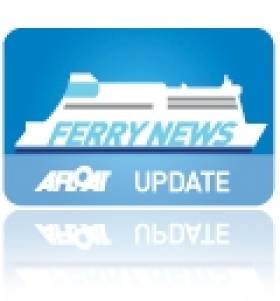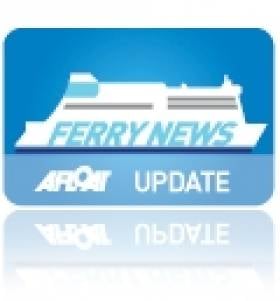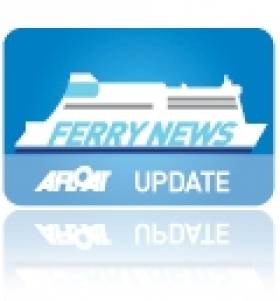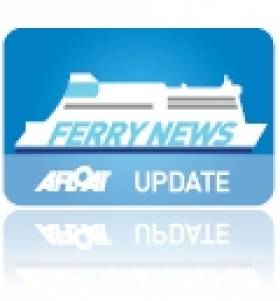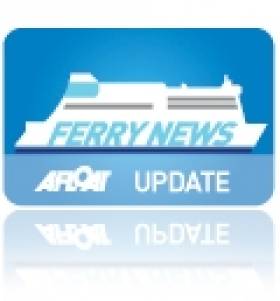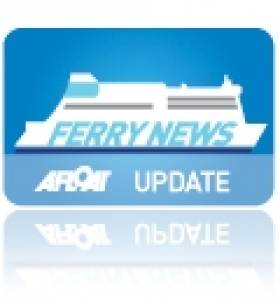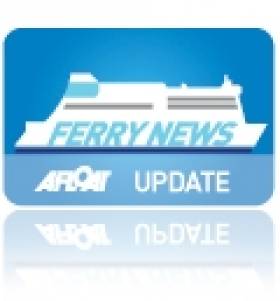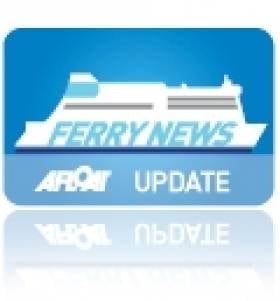Displaying items by tag: Epsilon
'Run Ahead of' 154km/h Storm Attempt Caused 'Worst Ever' Irish Ferries Crossing from France
#ferry - Commanders who took a decision of an Irish Ferries ship to “run ahead of” a Status Orange storm writes The Journal.ie led to multiple injuries and extensive damage to freight cargo, a report has found.
Ten passengers and two crew members were injured when the MV Epsilon was caught during Storm Imogen while en route from Cherbourg in France in February 2016, (see Afloat's report).
The Italian-built ship hit winds of 60 knots in what one observer said was probably the “worst ever” crossing from France, adding that it was “lucky the ship was not lost”.
A report by the Marine Casualty Investigation Board (MCIB) into the incident found that the issue may have arisen because of a reliance upon an outdated weather forecast.
It also raised concerns over how decisions were made by both masters on the ship before it sailed.
According to the report, the night-time duty master voiced concerns about the impending storm during his hand over to the senior master at 7.00am on 7 February.
However, he was overruled by the day-time duty master – the ship’s senior master – and the sailing was prosecuted as scheduled.
For much more, click here.
Storm Damage Revealed as Irish Ferries Ship Epsilon Docks in Dublin Port
Irish Ferries ship Epsilon sustained extensive damage to her cargo – estimated by an Afloat source at thousands of Euro – having sailed from Cherbourg Sunday at 17:30 into the teeth of Storm Imogen. The 2011 Italian–built ship hit winds of a constant 60–knots with gusts of 105–knots at times. One observer said it was most likely the 'worst ever' crossing from France and suggested it was 'lucky the ship was not lost'.
Heavy seas and winds blowing up to Force 11 meant the Epsilon, sailing from Cherbourg to Dublin, had to divert into safer waters. The ship was forced to take shelter at sea in waters off the north Devon coast.
The sailing, due to arrive in Dublin at 11am on Monday morning, arrived Tuesday lunchtime.
Epsilon is the most recent addition to the Irish Ferries fleet and offers an economy class service on both the Dublin Port to Holyhead and Dublin Port to Cherbourg routes.
Rosslare Europort Revisited by Car-Touring ‘Epsilon’ One-Year On
#EpsilonYear1 - Irish Ferries Dublin-Cherbourg route launched a year ago by ro-pax Cartour Epsilon as previously reported on Afloat.ie, made an en-route to Rosslare Europort last Monday having sailed from France, writes Jehan Ashmore.
The chartered Italian flagged ferry Epsilon (since renamed without her prefix) began the new year-round operated service in January 2014. The service is marketed as an economy class alternative to the operators Rosslare-France routes.
During last week's call to the Co. Wexford port both motorist-passengers and freight vehicles disembarked.
Such calls to the south-east ferryport will remain in place until the operator's cruiseferry, Oscar Wilde resumes routine Rosslare-Cherbourg sailings that reopens this day next month (25 February).
Last year as the then Cartour Epsilon, she had also covered 'Oscar's continental crossings to and from Rosslare (see report). This involved her standing in for Isle of Inishmore while on the Pembroke route.
The 2011 built Epsilon is scheduled to dock in Rosslare tomorrow morning. Again all traffic from the French route will be unloaded in addition to what is understood to be a contract to carry trade vehicles.
Having completed these duties, the 26,375 tonnes vessel will continue the final leg of the triangular route with a passage in ballast to Dublin Port but not arrival until 22.00.
Following this, Epsilon settles back on her weekday Dublin-Holyhead sailing roster (except on Mondays), hence her late arrival tomorrow night to the port.
Her role on the Welsh route had preceded the French service as she was first introduced on the Irish Sea route last December.
Since her double route debut, Epsilon has boosted capacity resulting in improved trading figures for Irish Ferries whose parent company is Irish Continental Group.
Epsilon’s Entry Contributes Positive Results for Irish Ferries
#EpsilonEconomics – Irish Ferries introduction of ro-pax Epsilon almost a year ago has led to a rise in overall fuel costs as previously reported on Afloat.ie, however in general she has been financially rewarding, writes Jehan Ashmore.
According to Ships Monthly, the chartered Italian-flagged ro-pax has contributed to a positive recovery in Irish Ferries core ro-ro and car markets as indicated for results for the first half of the 2014-15 financial year, to 23 August. There has been a 20% rise in the ro-ro freight sector and 8% was achieved in passenger cars.
Epsilon's ro-pax design enables a large freight capacity to be handled while still carrying passengers. The 26,375 tonnes vessel was launched in 20011 from the yard of Visentini, a shipyard close to Venice. She offers an economy service and limited facilities.
The ro-pax was first pressed into Irish Sea service providing additional capacity on the Dublin-Holyhead route during weekdays.
In addition to Welsh route duties, she launched in January this year a new direct Ireland-France service where at weekends she makes a round trip to the continent linking the Irish capital and Cherbourg in Normandy.
To read more about Epsilon's two-route role click the following link of Afloat.ie interview with her master and accompanying photographs including the ferry during a passage on the Dublin-Cherbourg route.
In another interview published in Ships Monthly (January 2015) the Epsilon is depicted in a photo of the ro-pax following an overnight sailing from Dublin when arriving within the harbour of Cherbourg.
What’s in a Re-Naming, Irish Ferries Newcomer ‘Epsilon’
#NameEPSILON - Irish Ferries chartered newcomer Cartour Epsilon introduced in late 2012 firstly on Dublin-Holyhead service and in January launching a new Dublin-Cherbourg route has been renamed, writes Jehan Ashmore.
The renaming albeit shortened to 'Epsilon' took place late last month and is a move away by Irish Ferries from the naming theme derived from previous Italian operator, Caronte & Tourist. They operate a pair of Visentini-built sisters, 'Cartour' Gamma / Delta from Salerno to the Sicilian port of Messina.
As Epsilon is chartered she continues to fly the Italian flag and port of registry of Bari on the Adriatic Sea from where the Visentini shipyard near Venice launched her as Akerman Street. It is understood she ran initially for Epic Shipping Ltd and Visemar before her last role off the 'boot' of Italy.
Irish Ferries new entrant has a 500-passenger capacity and facilities are a restaurant, bar/lounge, shop kiosk, free Wi-Fi and en-suite cabins accommodating 2 and 4-berth cabins all equipped with T.V.
Overall facilities are limited and as such the new Ireland-France route is been advertised as an alternative 'economy' service.
Irish Ferries continue to operate the family-friendly cruiseferry Oscar Wilde on the established Rosslare-Cherbourg route that reopened last month and a seasonal service to Roscoff.
Epsilon brings a capacity boost to the Dublin-Holyhead route as Irish Ferries will undertake 5,000 sailings to the UK (up from 4,122 in 2013) and this includes Rosslare-Pembroke Dock services.
In addition to 380 continental crossings on the Dublin-Cherbourg route which is an increase of 259 sailings on last year.
‘Epsilon’ Delayed Debut on Dublin Service to Start Next Week
#Epsilon – Irish Ferries cite fleet dry-docking and 'operational reasons' for the delays in introducing 'Epsilon' which is to boost additional peak capacity over the Christmas season, writes Jehan Ashmore.
As previously reported, Epsilon was to have made her debut this week on the core Dublin-Holyhead route, bringing thousands of seasonal passengers home and overseas visitors to our shores.
Epsilon is not expected to start operationg until next week (Tuesday 17 Dec.) with the 01.55 sailing departing from Ireland. She will provide additional sailings by operating two-round trips daily, which increases to a maximum of 12 sailings daily on the Dublin-Holyhead route.
The 26,375 tonnes ro-pax with space for around 500 passengers will join fleetmates, Ulysses and fastcraft Jonathan Swift and together the trio will provide a maximum of 12 sailings each day.
Epsilon's entry as third route ship will extend beyond New Year sailings too as the 186m long vessel is on charter for the next three years. During this timefrane she will also operate Dublin-Cherbourg route service starting 18 January.
French Routes Ro-Pax Rival Sisters Meet in Rosslare Harbour
#NewFerry – Irish Ferries chartered ro-pax Epsilon called to Rosslare Europort from Cherbourg this morning, her arrival to Irish waters follows a repositioning voyage starting almost a week ago from Sicily, writes Jehan Ashmore.
Under the command of Captain Paul Sellers, Epsilon approached the Wexford ferryport from where Irish Ferries Pembroke Dock bound Isle of Inishmore vacated her berth for the newcomer.
Ironically at the adjacent berth to where Cartour Epsilon (2011/26,325grt) berthed was Celtic Horizon (2006/27,522grt) of Celtic Link Ferries which in 2011 entered service on their service to Cherbourg. She is a sister and former fleetmate which as Cartour Beta also served Italian operator Charonte & Tourist.
Epsilon's call to the Wexford port was likewise to Cherbourg to carry out berthing trails when Irish Ferries requires relief cover on southern services.
She is due to make the final leg of her journey to Dublin Port to where the ro-pax ferry is to enter service on the Holyhead route this week and in the New Year launch a new Dublin Port-Cherbourg route.
Also berthed in Rosslare Harbour was Stena Europe, the Fishguard route ferry which was fresh from annual maintenance following dry-docking in Birkenhead.
New Ferry ‘Epsilon’ Underway on Final Leg to Irish Waters
#NewFerry – 'Epsilon' Irish Ferries new ro-pax ferry continues her voyage to Ireland as she rounds Land's End tonight having called today to Cherbourg for berthing trials, writes Jehan Ashmore.
The call to Normandy represents the first of three ports that she will serve on her two-route roster which sees the 2011 built ferry firstly make her debut between Dublin-Holyhead later this week.
The second route in which Epsilon is to be deployed, Dublin-Cherbourg will be run on a year-round basis. The economy-style service will cater for motorist based passengers and for freight vehicle customers, albeit foot passengers will not be carried.
Epsilon's call to Rosslare Harbour is due for berthing trails, as Irish Ferries intend that the Italian flagged newcomer also provide relief cover on sailings from the Wexford port.
Captain Paul Sellers who has charge of the chartered ferry which departed Sicily last week, will be back in local waters as he is a master of the Isle of Inishmore which serves Irish Ferries route to Pembroke Dock.
The operator's second ship running from Rosslare Harbour is the French routes cruiseferry, Oscar Wilde which is currently maintaining added capacity as the third ship on the Dublin-Holyhead route.
She is expected to return to Rosslare-Cherbourg sailings later this week, pending the smooth introduction of Epsilon further north between the Irish capital and Anglesey.
#NewFerry – 'Epsilon' the new ro-pax ferry on charter to Irish Ferries is currently off the Portuguese coast heading to Cherbourg for berthing trials, prior to making her debut on the Irish Sea, writes Jehan Ashmore.
The Italian flagged 26,375 tonnes vessel is under the charge of Capt. Paul Sellers, a master of the Rosslare-Pembroke Dock route vessel Isle of Inishmore.
Earlier this week as previously reported, she departed Messina, Sicily on her repositioning voyage to Irish waters and so far this has involved a call to Gibraltar for bunkers.
The newcomer was previously on charter as Cartour Epsilon to Caronte & Tourist service between Italy and Sicily. The 500 passenger and crew ferry will also make en-route ports of call to carry out berthing trials in Rosslare and Holyhead.
Epsilon is scheduled to launch her sailings between Dublin-Holyhead next week.
In the meantime Oscar Wilde which is off service from the French route to Cherbourg is covering the Dublin-Holyhead route until Epsilon takes over the same roster in a boost to capacity as the third ship on the route.
In mid-January 2014, Epsilon also launches a new Dublin-Cherbourg route where she will operate at weekends a round-trip schedule in addition to maintaining weekday sailings on the Dublin-Holyhead route
Irish Ferries Increases Capacity on Irish Sea Dublin to Holyhead Route
#ferry – Irish Ferries is to increase its capacity and frequency on the Dublin to Holyhead route through the introduction of a third ship in December 2013.
Currently, the ferry company operates eight sailings per day on the key Irish Sea route using its flagship Ulysses and the High Speed Craft Jonathan Swift.
Irish Ferries has chartered the Epsilon (2011 built ) to supplement its existing Ireland to Britain services. The ship will provide two additional departures per day in each direction which will result in an increase in the company's schedule to a maximum of twelve sailings between Dublin and Holyhead each day. The recently built vessel will provide significant vehicle capacity along with modern facilities on board including cabins, bar/cafeteria and self-service restaurant.
Targeting the growing Freight and Tourism markets, the Epsilon will further improve Irish Ferries' range of offers to its customers on the Irish Sea. In addition to the improved frequency on its Dublin to Holyhead route, the chartered vessel will also provide opportunities for improved annual dry-dock cover within the company's fleet along with scope for increased capacity on other Irish Ferries' Irish Sea and Ireland to France services.
Commenting on the announcement, Irish Ferries' Marketing Director, Tony Kelly, said, "Irish Ferries decision to invest in additional capacity at this time is a major vote of confidence by the Republic of Ireland's leading ferry operator in the recovery of the country's economy. We believe that Ireland has turned the corner and we are prepared to invest in the provision of improved services for our valued Freight and Tourism customers who have shown fantastic loyalty throughout the last five difficult years."
SHIP STATS
Name: 'Epsilon'
Built: Delivered 2011, Cantiere Navale Visentini, Italy
Flag: Italy (IMO No. 9539054)
Length Overall (LOA): 186.46 metres
Free Height: 4.87 metres main deck
Beam: 25.6 metres
Draft: 6.85 metres
Maximum Speed: 24 knots
Passenger Capacity (PC): 500 plus crew
Cabins: 68 x 4 berth + 2 x 2 berth (disabled)
Vehicle Deck Capacity: Approx 2,860 lane metres



























